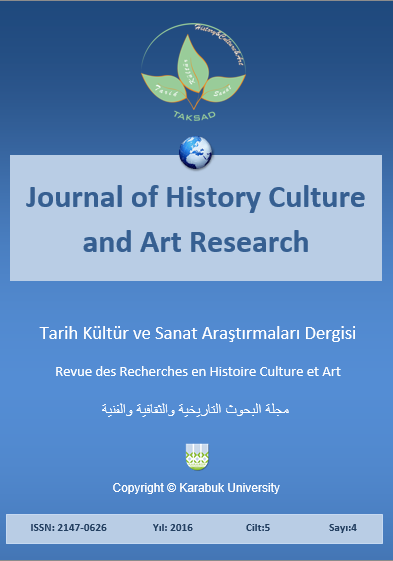The Investigation of Identity Crisis in Newly Established Cities of Iraq: A Research on Qaedin and Khawarij
DOI:
https://doi.org/10.7596/taksad.v5i4.581Keywords:
Khawarij, Kufa, identity crisis, conquests, uneven development, crisis in Iraq.Abstract
The uneven development of Islam after the death of Prophet Muhammad has caused the lack of provision of identity backgrounds for Bedouin majority of Muslims and those of companions who exited the range of Islamic community turned to acquisition of other nations’ identities. This issue has led to many identity crises in Islamic community. These identity disorders have passed a 25-year process at the era of the three caliphs until they reached the crisis level. The peak of these crises started with the killing of Usman and during the reign of the fourth caliph, Ali, was more revealed. Numerous conflicts with other unauthentic Islamic tendencies, blending with the course of identities, the lack of development of critical thinking and recorded identities, and identity gap were of the most important crises that Ali’s reign was faced with. The result of these heterogeneities was the emergence of two dominating groups of Mozabzab (hesitant)-Qaedin (leaders), and Extremist-Khawarij in cities of Kufa. Using the psychological analysis of historical context, in this study, it is tried to answer the questions that: the collective identity crises was the result of what factors? Each group of this society was faced with what kind of crisis? Sheldon Stryker’s theory of identity crisis and Erik Erikson’s theory of growth and identity are used to answer to these questions.
References
Abdulmaqsud, Abdul Fattah (1983). Imam Ali (PBUH), Translated by Mohammad Mahdi Ja'fari, Tehran: Enteshar Stock Company.
Adibi sadeh, Mahdi (2001). Sociology of War, Tehran: Samt.
Alaaely, Abdullah (1993). The Best Goal in Highest Soul, translated by Mohammad Mahdi Ja'fari, Tehran: Ministry of Islamic Culture and Guidance.
Delshad Tehrani, Mostafa (2001). Government of Sun, Tehran: Darya.
Holy Qur'an.
Ibn Abi Alhadid (1995). Illustration of Nahj-ul-Balagha, Research by Muhammad Abulfazl Ibrahim, Cairo: Dar-ul-Ihya al-Kutub al-Arabiya.
Jaberi, Muhammad Abed (2006). Political Wisdom in Islam, Translated by Abdorreza Savari, Tehran: Gaame-Now.
Lewis, Bernard (2003). Middle-East, Translated by Hassan Kamshad, Tehran: Ney.
Madelung, Wilfred (1999). The Succession to Muhammad (PBUH), Translated by Ahmad Namaee - Javad Qasemi - Mohammad Javad Mahdavi and Heydar Reza Zabet, Mashhad: Astan Quds Razavi.
Desrochers, Stephan and Andreassi, Jeanine K., and Thompson, Cynthia A. (2004). Identity Theory, organization management journal, vol. 1 no.1, pp. 61-69
Owens, Timothy J. and Stryker, Sheldon (2001). The Future of Self-Esteem: An Introduction Extending Self-Esteem Theory and Research, Sociological and Psychological Currents, Eds. by Timothy J. Owens and Sheldon Stryker and Norman Goodman Cambridge: Cambridge University Press.
Ritzer, George (2006). Contemporary Sociological Theories, Translated by Mohsen Salasi, Tehran: Elmi.
Schultz, Daunt P. and Sydney Ellen Schultz (2005). Theories of Personality. New York: Wadsworth.
Stets, Jan E. and Burke, Peter J. (2003). A Sociological Approach to Self and Identity, In Handbook of Self and Identity, Eds Mark R. Leary and June Price Tangney, New York: Guilford Press
Stryker, Sheldon and Burke, Peter J. (2000). The Past, Present, and Future of an Identity Theory, Social Psychology Quarterly, Vol. 63, No. 4, Special Millennium Issue on the State of Sociological Social Psychology, pp. 284-297
Stryker, Sheldon (1999). Exploring the Relevance of Social Cognition for the Relationship of Self and Society: Linking the Cognitive Perspective and Identity Theory, The Self–Society Dynamic Cognition, Emotion and Action, Edited by Judith A. Howard and Peter L. Callero, Cambridge: Cambridge University Press.
Tabari, Muhammad bin Jurayr (1984). History of Islam - Vol II - Prophets and Patriarchs, Translated by Abolqasem Payandeh, Tehran: Asatir.
Turner, J. (2003). The Structure of Sociological Theory. New York: Wadsworth.
Watt, W. Montgomery (1987). Islamic Philosophy and Theology an extended survey, Edinburg: Edinburg university press.
Zargari Nezhad, GhlomHosein (2006). Analytical History of Early Islam, Tehran: Samt.
Zarrinkoob, Abdolhossein et al. (1985). History of Iran from Islam to Saljuqi's Era Research of University of Cambridge, Tehran: Amir Kabir.
Zaydan, Jurji (1906). History of Islamic Civilization, Beyrut: Daar-assadir.
Downloads
Published
How to Cite
Issue
Section
License
All papers licensed under Creative Commons 4.0 CC-BY.- Share — copy and redistribute the material in any medium or format
- Adapt — remix, transform, and build upon the material for any purpose, even commercially.
Under the following terms:
Attribution — You must give appropriate credit, provide a link to the license, and indicate if changes were made. You may do so in any reasonable manner, but not in any way that suggests the licensor endorses you or your use.
- No additional restrictions — You may not apply legal terms or technological measures that legally restrict others from doing anything the license permits.







